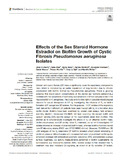Citation link:
http://dx.doi.org/10.25819/ubsi/10218Files in This Item:
| File | Description | Size | Format | |
|---|---|---|---|---|
| Effects_of_the_sex_steroid_hormone_estradiol.pdf | 4.05 MB | Adobe PDF |  View/Open |
| Dokument Type: | Article | metadata.dc.title: | Effects of the sex steroid hormone estradiol on biofilm growth of cystic fibrosis Pseudomonas aeruginosa isolates | Authors: | Al-Zawity, Jiwar Afzal, Faria Awan, Aysha Nordhoff, Daniela Kleimann, Alexander Wesner, Daniel Montier, Tristan Le Gall, Tony Müller, Mareike |
Institute: | Department Chemie - Biologie | Free keywords: | Estradiol, Pseudomonas aeruginosa, Biofilm growth, Cystic fibrosis, Clinical isolates, Quorum sensing | Dewey Decimal Classification: | 570 Biowissenschaften; Biologie | GHBS-Clases: | VOW | Issue Date: | 2022 | Publish Date: | 2023 | Source: | Frontiers in Cellular and Infection Microbiology ; 12, 941014. - https://doi.org/10.3389/fcimb.2022.941014 | Abstract: | Women with cystic fibrosis (CF) have a significantly lower life expectancy compared to men, which is indicated by an earlier impairment of lung function due to chronic colonization with biofilm formed by Pseudomonas aeruginosa. There is growing evidence that blood serum concentrations of the steroid sex hormone estradiol (E2) correlate with the occurrence of pulmonary exacerbations in CF but also play a role in the mucoid switch of P. aeruginosa. This study aims to shed light on possible microbiological reasons for sexual dimorphism in CF by investigating the influence of E2 on biofilm formation of P. aeruginosa CF isolates. For this purpose, 10 CF isolates of the respiratory tract derived from different CF patients have been treated with E2 in a microtiter plate biofilm model. Biofilms have been examined by crystal violet assays, field emission scanning electron microscopy (FE-SEM), 3D laser scanning microscopy (LSM), and quorum sensing (QS) reporter assays of the supernatants taken from biofilms. This allowed us to simultaneously investigate the effects of E2 on attached biofilm mass, biofilm ultrastructure, and QS activity. Upon E2 treatment, six out of 10 investigated CF isolates showed an increase of attached biofilm mass, whereas biofilms from two tested non-CF laboratory strains (PAO1 and ATCC19660) did not. Moreover, FE-SEM and 3D LSM analyses of the E2 responsive CF biofilms revealed ultrastructural remodeling of biofilm structure at different scales with increased formation of prominent biofilm spots, enhanced coverage with extracellular polymeric substance (EPS), and extended average surface roughness. QS activity measurements performed in biofilm supernatants via luminescence acyl homoserine lactone (AHL) reporter assays further showed that E2 treatment may also modulate QS signaling, as shown in an E2 sensitive CF isolate. Together, our results suggest the biofilm modulating effects of E2 on various clinical CF isolates that are documented by both biomass and ultrastructural changes of biofilms. The gained new insight into the influence of steroid hormones on P. aeruginosa biofilm phenotypes might pave the way for novel future approaches in personalized medicine based on the patients’ sex and hormonal status. |
Description: | Finanziert aus dem Open-Access-Publikationsfonds der Universität Siegen für Zeitschriftenartikel |
DOI: | http://dx.doi.org/10.25819/ubsi/10218 | URN: | urn:nbn:de:hbz:467-23077 | URI: | https://dspace.ub.uni-siegen.de/handle/ubsi/2307 |
| Appears in Collections: | Geförderte Open-Access-Publikationen |
This item is protected by original copyright |
Page view(s)
354
checked on Dec 26, 2024
Download(s)
72
checked on Dec 26, 2024
Google ScholarTM
Check
Altmetric
Items in DSpace are protected by copyright, with all rights reserved, unless otherwise indicated.

